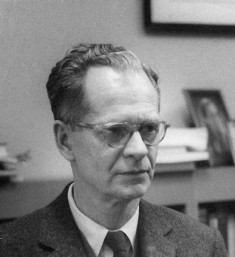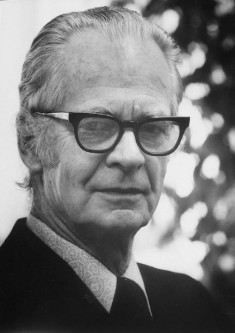| B. F. Skinner | |
|---|---|
 |
|
| Psychologist | |
| Born | Mar. 20, 1904 Susquehanna, Pennsylvania, United States |
| Died | Aug. 18, 1990 (at age 86) Cambridge, Massachusetts, United States |
| Nationality | American |
B. F. Skinner was an American psychologist. He was also a philosopher, inventor, psychologist, and author. Skinner was the inventor of the Skinner Box, more formally known as the operant conditioning chamber. He believed that there was no such thing as true free will, and that human actions actually depended on their consequences.
Skinner was the instigator of radical behaviorism, and was also the inventor of the cumulative recorder. He published more than 20 books, as well as close to 200 articles, and is considered highly influential in 20th century psychology.
Early Life
Skinner was born in Susquehanna, Pennsylvania, on March 20, 1904. He was the son of a lawyer, who was the breadwinner for the family while he was cared for by his mother. Skinner was an avid inventor even as a child, frequently putting together small gadgets.
After leaving school, he went to Hamilton College, where he discovered an affinity for the written word. After his graduation from the college in 1926, he attempted to write professionally, but he was not successful in this. In 1928, he reluctantly accepted that writing was not the right career for him, and instead went to study psychology at Harvard University.
First Experiments
Once there, Skinner hoped to discover a scientifically objective way in which he could study behavior. He developed an apparatus for operant conditioning, later to receive its informal name in his honor. This box allowed Skinner to make studies of the interaction between animals and their environment.
His first experiments were on rats, and he noticed that they were quickly able to discover that a certain point in the box dispensed food. He later moved on to the study of pigeons, which were required to peck a disk in order to reach their treats. Skinner inferred from his observations that learning new behavior was dependent on reinforcement.
Mature Work
Once he had graduated with his doctorate, Skinner spent some time on research work at Harvard. He then published his Skinner Box results in his 1938 book, The Behavior of Organisms. His findings were compared with those of Ivan Pavlov, although those had concentrated on involuntarily stimulated responses rather than the learned responses of Skinner’s work.
He then went to teach at the University of Minnesota, and when World War Two broke out he hoped to assist in bombing runs by using trained pigeons as guides. Although unsuccessful in this aim, he did succeed in teaching them to play simple games such as table tennis.
Career and Personal Life
 In 1943, Skinner’s second daughter was born, and his wife asked him to devise a new type of crib. He built what he called a baby tender: a heated, clear box that did away with the need for blankets. The lack of slats around the sides of the box also guarded against one common cause of injury.
In 1943, Skinner’s second daughter was born, and his wife asked him to devise a new type of crib. He built what he called a baby tender: a heated, clear box that did away with the need for blankets. The lack of slats around the sides of the box also guarded against one common cause of injury.
In 1945, Skinner moved to Indiana University to chair its psychology department, but the lure of Harvard remained strong and he accepted a lecturing position there in 1947. He was to remain at Harvard for the remainder of his career, and was given professorial status in 1948. His interest in education grew along with his children, and he wrote Walden Two, a novel dealing with some of his own ideas of behavior.
Later Years
Some of the faculty objected to Skinner’s writing of fiction, feeling that it did damage to both his own and the department’s scientific credibility. Other colleagues were unhappy with his virtual sidelining of the intangibles of life and his exclusive concentration on measurable, objective results.
Nevertheless, he continued to teach at Harvard, and by the 1960s he had become very well known even outside his own field. In the latter part of that decade, Skinner started on a series of publications about society as seen through the lens of his own theories of behavior. Among the most prominent of these was the 1971 work, Beyond Freedom and Dignity.
Legacy and Death
Again Skinner was attacked by some of his contemporaries, most notably Noam Chomsky, for his denial that free will truly existed. Skinner felt that he had been misinterpreted and attempted to make his position clearer in About Behaviorism, which appeared in 1974.
He continued to work in his field for some years, but also wrote several autobiographies during the 1980s. In 1989, however, he fell ill with leukemia, and his condition deteriorated rapidly. Skinner died on August 18, 1990, at his Cambridge, Massachusetts home. His daughter, Julie S. Vargas, continued to promote his views via the B. F. Skinner Foundation.